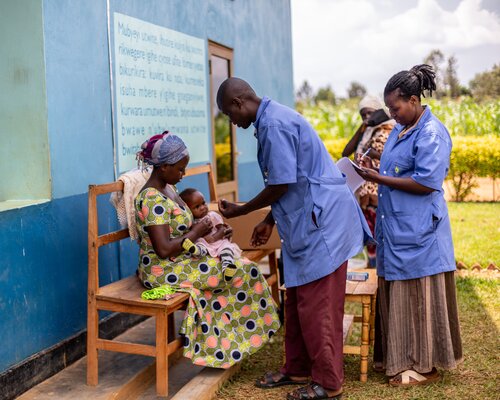UHC2030 hosted its annual UHC Day parliamentarian town hall to...
17 February 2024
A statement from UHC2030 Co-Chairs

As heads of state meet in Addis Ababa for the 37th Ordinary Session of the African Union (AU) Summit on 17–18 February, we call for bold action on health and universal health coverage (UHC). Recent work by the AU demonstrates that African leaders recognise the importance of UHC for the continent. Achieving UHC by 2030 is a strategic objective of the Africa Health Strategy 2016–2030, and the AU has implemented bold steps towards making this goal a reality. By rolling out the community health worker program and related initiatives, AU members are strengthening the health workforce, the backbone of Africa's health systems. By implementing the 2019 Africa Leadership Meeting: Investing in Health recommendations, countries across the continent have also been strengthening their domestic investments in health. In 2024, 23 African countries have increased their health spending as percentage of GDP over 2023 levels, progressively heading towards the aspirational target of 5%.1
But despite bold actions, the situation in Africa remains dire: 615 million individuals – about half of the continent’s population – do not receive the healthcare services they need. And about 97 million people face catastrophic health care costs when paying for health services.2 These are not just numbers; they represent the daily struggle of billions worldwide who are denied the right to health, well-being and dignity. This includes women and girls who have been hit the hardest by recent infectious outbreaks or climate change-related events.
By achieving UHC, countries could alleviate this struggle. UHC means that all people have access to the full range of quality health services they need, when and where they need them, without financial hardship. UHC is central to achieving health for all and health equity. UHC based on resilient and equitable health systems is also key to ensuring that countries are fit to address health challenges and threats – including those arising from climate change, conflicts, humanitarian crises and other health emergencies.
As heads of state meet at the AU Summit, we urge African leaders to recall the importance of UHC in their deliberations. At the UN High-level Meeting on UHC in September 2023, countries reaffirmed their commitment to accelerate progress towards achieving health for all by 2030. Now is the time to translate commitments into actions. To do so, African leaders should:
- Invest in UHC. Prioritise primary health care – focusing on vulnerable communities – as it can deliver 90% of essential health services, increase average life expectancy by 3.7 years by 2030, and save 60 million lives in low- and middle-income countries, including many in Africa. With primary health care, health systems can be better prepared to prevent and respond to health emergencies thanks to sufficient health workers, lab and data capacity, and basic services that can rapidly detect and respond to outbreaks while continuing to deliver essential services.
- Strengthen the health and care workforce. Invest in the training and retention of health workers, including by addressing existing shortages, and ensure decent pay and working conditions – focusing on community health workers – to ensure they are equipped to deliver high-quality health care.
- Institutionalise social participation in decision-making. Ensure people have a say in the laws and policies that affect their health and well-being, as this is the best way to ensure their needs are addressed and to build trust in public action.
As heads of state gather at the AU Summit in Addis Ababa, we call on them to keep UHC at the top of the agenda and deliver on their promise to achieve health for all by 2030. By progressing towards UHC, African leaders can strengthen the health and well-being of their populations, including marginalised and vulnerable communities, while working towards a prosperous and peaceful Africa with striving communities.
-Ms Gabriela Cuevas Barron and Dr Justin Koonin, Co-Chairs of the UHC2030 Steering Committee
- Africa Scorecard on Domestic Financing for Health 2024, https://score-card.africa/scorecard, accessed 16 February 2024
- AHAIC Commission: The State of Universal Health Coverage in Africa, https://ahaic.org/download/executive-summary-the-state-of-universal-health-coverage-in-africa/, accessed 16 February 2024
Photo: WHO / Isaac Rudakubana
